外研版(2019)必修 第一册Unit 2 Exploring English Using language课件(共52张PPT)
文档属性
| 名称 | 外研版(2019)必修 第一册Unit 2 Exploring English Using language课件(共52张PPT) | 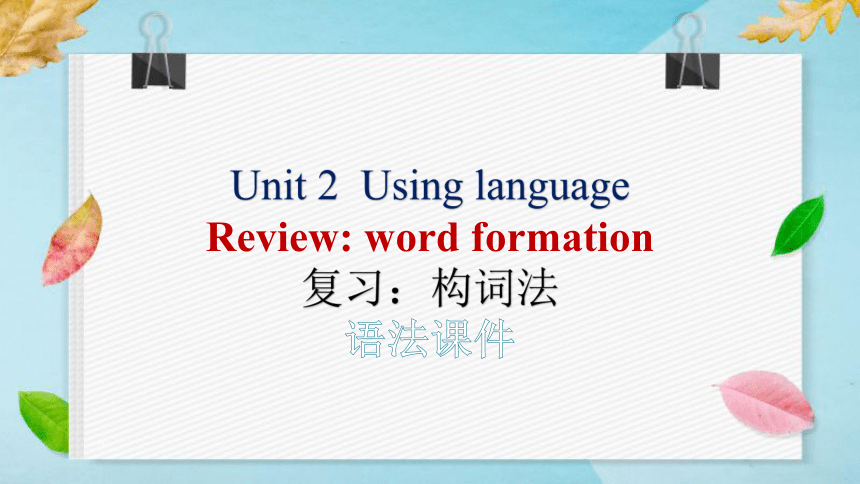 | |
| 格式 | pptx | ||
| 文件大小 | 30.0MB | ||
| 资源类型 | 教案 | ||
| 版本资源 | 外研版(2019) | ||
| 科目 | 英语 | ||
| 更新时间 | 2024-10-10 16:46:11 | ||
图片预览

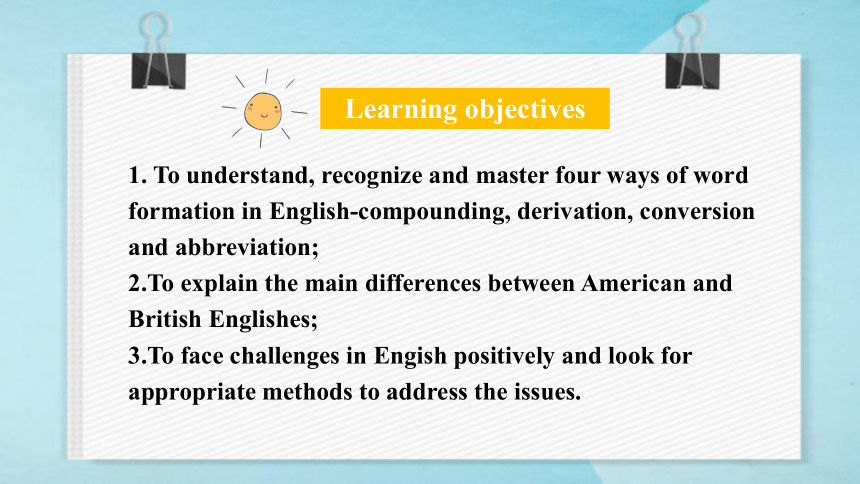
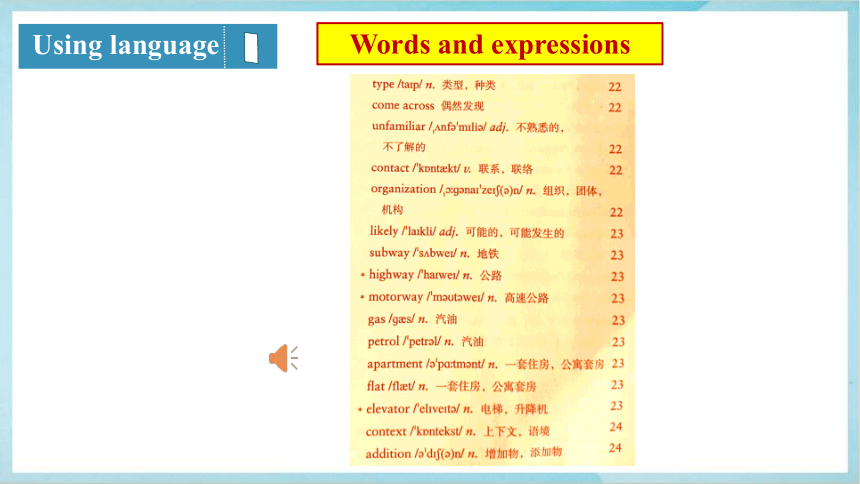
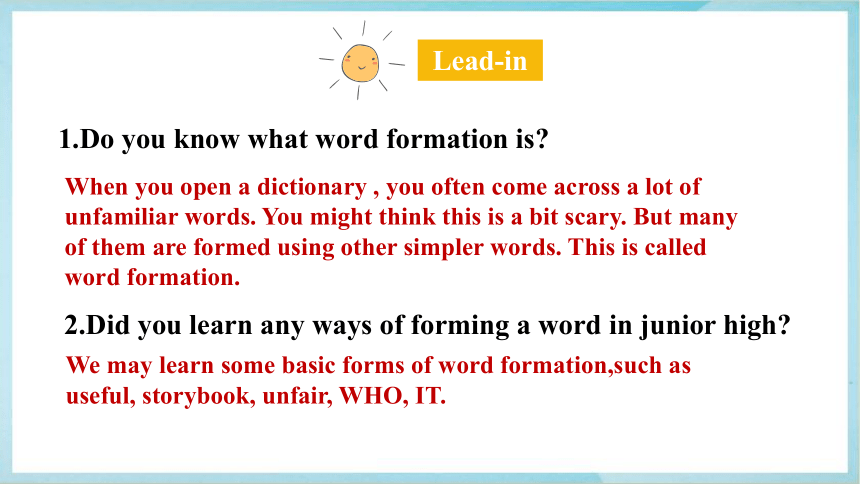
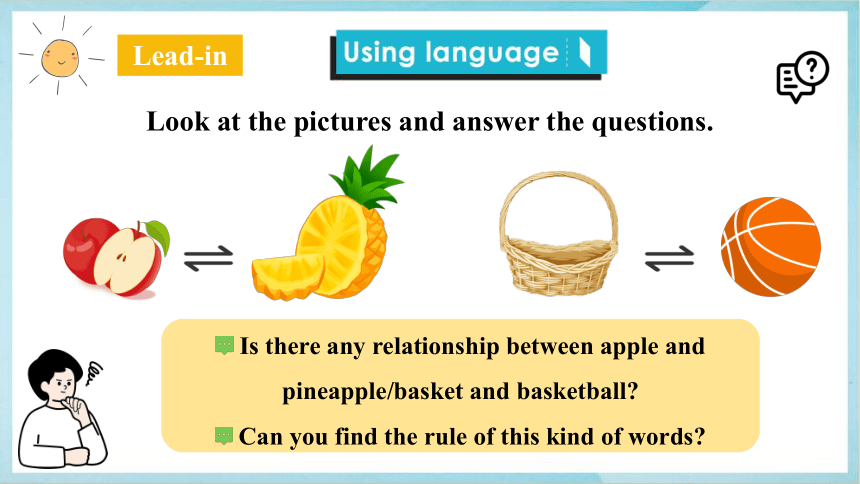
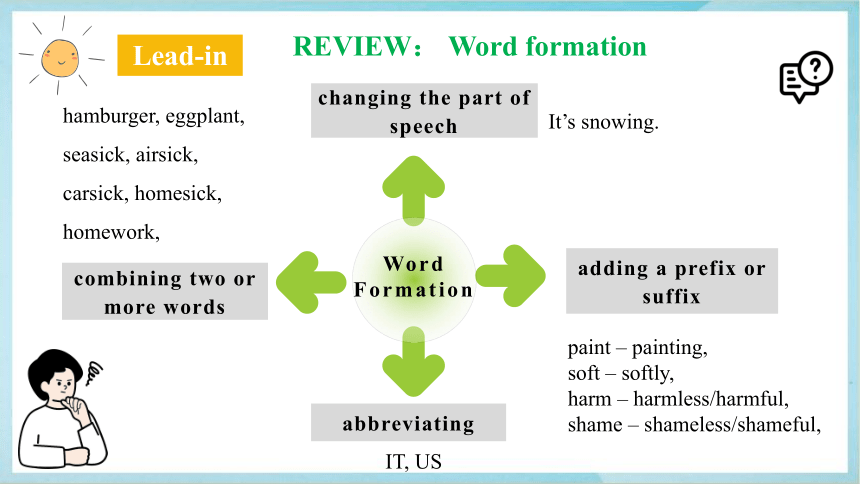

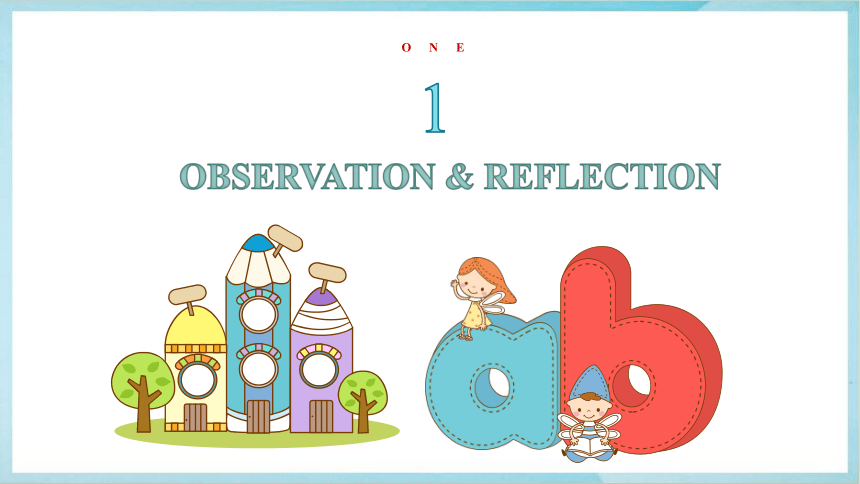
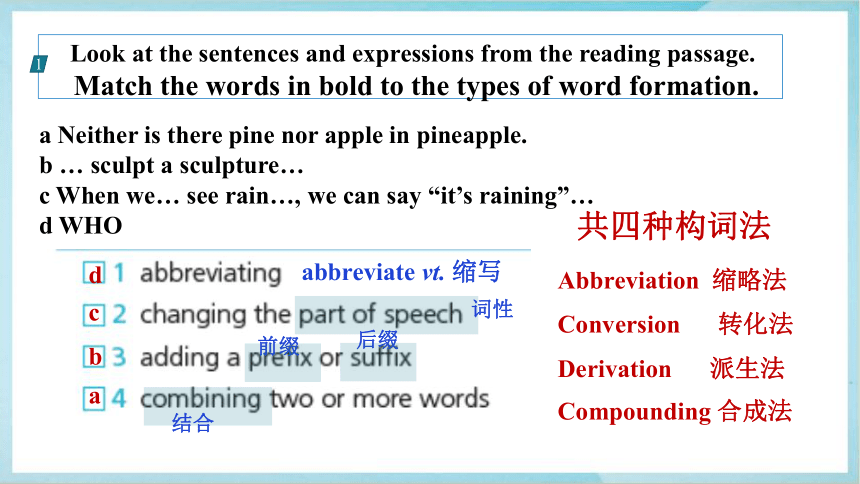

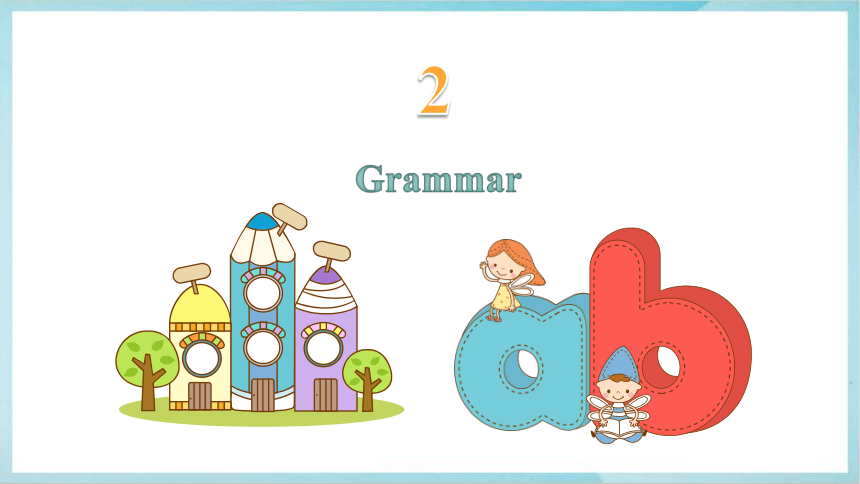
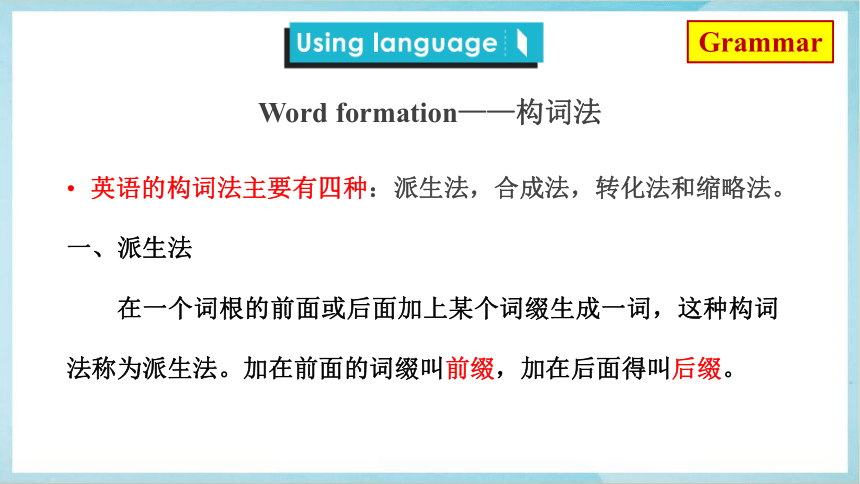
文档简介
(共52张PPT)
Unit 2 Using language
Review: word formation
复习:构词法
语法课件
1. To understand, recognize and master four ways of word formation in English-compounding, derivation, conversion and abbreviation;
2.To explain the main differences between American and British Englishes;
3.To face challenges in Engish positively and look for appropriate methods to address the issues.
Learning objectives
Words and expressions
Using language
When you open a dictionary , you often come across a lot of unfamiliar words. You might think this is a bit scary. But many of them are formed using other simpler words. This is called word formation.
1.Do you know what word formation is
2.Did you learn any ways of forming a word in junior high
We may learn some basic forms of word formation,such as useful, storybook, unfair, WHO, IT.
Lead-in
Look at the pictures and answer the questions.
Is there any relationship between apple and pineapple/basket and basketball
Can you find the rule of this kind of words
Lead-in
REVIEW: Word formation
abbreviating
combining two or more words
adding a prefix or suffix
Word Formation
IT, US
changing the part of speech
hamburger, eggplant, seasick, airsick, carsick, homesick, homework,
paint – painting,
soft – softly,
harm – harmless/harmful,
shame – shameless/shameful,
It’s snowing.
Lead-in
Outlines of the mind map
总
分
总
1 介绍构词法定义
6 综述构词法意义
3 词缀法举例描述
5 缩略法举例描述
4 转化法举例描述
2 复合法举例描述
Lead-in
1
OBSERVATION & REFLECTION
ONE
a Neither is there pine nor apple in pineapple.
b … sculpt a sculpture…
c When we… see rain…, we can say “it’s raining”…
d WHO
abbreviate vt. 缩写
Look at the sentences and expressions from the reading passage.
Match the words in bold to the types of word formation.
前缀
后缀
词性
Abbreviation 缩略法
Conversion 转化法
Derivation 派生法
Compounding 合成法
结合
a
b
c
d
共四种构词法
1
Look for more examples of in the reading passage.
Work as a group of four, each in charge of one type and then share.
Compounding
合成法
Derivation派生法
Conversion 转化法
Abbreviation 缩略法
1
2
3
4
pineapple, hamburger, eggplant, seasick, carsick, homesick, homework, housework
sculpture, painting, hardly, softly, harmless- harmful,
shameless-shameful,
visible- invisble
rain, snow
IT, US
2
Grammar
英语的构词法主要有四种:派生法,合成法,转化法和缩略法。
一、派生法
在一个词根的前面或后面加上某个词缀生成一词,这种构词法称为派生法。加在前面的词缀叫前缀,加在后面得叫后缀。
Word formation——构词法
Grammar
前缀一般只改变词的意义,不改变词性。
(1) 表示否定意义的前缀
前缀
前缀 例词
un- unfit 不合适的 unlike 不像 unlimited
dis- dislike 不喜欢 disagree 不同意 disappear 消失
in-/im-/ir-/il- incomplete 不完全的 indirect间接的 inactive不积极的
non- non-smoker 不抽烟的人 non-stop 不停的
... ...
Grammar
(2) 表示程度,大小的前缀
前缀
前缀 例词
Super- superstar 超级明星 supermarket 超市
over- overeat过度进食 overuse过度使用
mini- minibus 小型公共汽车 miniskirt迷你裙
under- underground地下 underestimate 低估
... ...
Grammar
。
(3) 表示其他意义的前缀
前缀
前缀 含义 例词
a- ……的 asleep睡着的 alive活着的
en- 使…… enrich使丰富 enlarge 使扩大
inter- 互相 international 国际的 Internet 因特网
re- 再,又,重 recycle 再循环 rebuild 重建
tele- 远程的 television 电视 telescope 望远镜
auto- 自动 automatic 自动的 autodial 自动拨号
... ... ...
Grammar
2. 后缀:后缀通常改变词性,构成意思相近的其他词性的词,少数后缀会改变词义。(1) 形容词后缀
后缀
后缀 含义 例词
-able 可……的, acceptable 可接受的 movable 可移动的
-al 属于……的,
具有……性质的 cultural 文化的 professional职业的
-an 某地的,……人的 Asian 亚洲(人)的 Canadian加拿大(人)的
-en 由……制作的 wooden 木制的 woolen羊毛的
-ern ……方向的 eastern东方的 western 西方的
... ... ...
Grammar
(2) 动词后缀
后缀
后缀 含义 例词
-fy/-ify 使成…… simplify简化 classify将……分类
-en 变成;使 shorten 缩短 widen加宽
-ize/-ise 以……方式说 realize 实现 apologize 道歉
... ... ...
Grammar
(3) 副词后缀
后缀
后缀 含义 例词
-ly ……地 personally 就个人而言;亲自
totally 完全地
-ward(s) 表示“方向” forward(s)向前(地)
... ... ...
Grammar
(4) 名词后缀
后缀
后缀 含义 例词
-er 人 designer 设计师 programmer 程序员
-or 人 sailor 水手 actor 演员
-ist 人 specialist专家 artist 艺术家
-ess 女性,雌性 actress 女演员 lioness 母狮
-ness 性质,状态 cagermess热切 loneliness孤独,寂寞
-ment 状态,结果 excitement兴奋,刺激 achievement成就
Grammar
(5) 数词后缀
后缀
后缀 例词
-teen fourteen 十四 eighteen 十八
-ty forty 四十 eighty八十
-th fourth 第四 eighth 第八
Grammar
英语的构词法主要有四种:派生法,合成法,转化法和缩略法。
二、合成法
把两个或两个以上的词合成一个新词,这种构词法加合成法,由合成法构成的词叫合成词。
Word formation——构词法
Grammar
合成名词:
pickpocket 扒手 sunshine 阳光 playground 操场 daybreak 破晓haircut 理发 sunrise 日出 suitcase 手提箱 earthquake 地震waterfall 瀑布 sightseeing 观光 rooftop 屋顶 mankind 人类
合成动词:
sunbathe 沐日光浴 download 下载 whitewash 粉刷 sleepwalk 梦游 undergo 经历 blacklist 列入黑名单
合成法
Grammar
合成形容词:
whitewash 粉刷 noble-minded 高尚的 good-looking 好看的
hard-working 勤劳的 peace-loving 热爱和平的 breathtaking令人惊叹的
合成副词:
somehow 以某种方式,不知怎么地 overnight 在晚上;一夜之间
合成介词:
outside 在……外面 within 在……之内 throughout 在整个期间白始
合成法
Grammar
英语的构词法主要有四种:派生法,合成法,转化法和缩略法。
三、转化法
转化法一个单词由一种词性转化为另一种或几种词性,这种构词法称为转化法。
Word formation——构词法
Grammar
(1) 由名词转化为动词
face n. 脸→v. 面对 house n. 房屋→v. 给(某人)提供住处
nurse n. 护士→v. 护理 water n. 水→v. 浇水
(2)由动词转化为名词
cure v. 治疗→n. 治愈 lead v. 领导→n. 领先地位
bargain vi. 讨价还价→n. 便宜货 signal v. 发信号→n. 信号
(3) 由形容词转化为动词
empty adj. 空的→v. 把……腾空 narrow adj. 狭窄的→v. 使变窄
slow adj. 慢的→v. 减慢,使减慢 free adj. 自由的→v. 释放
转换法
Grammar
(4) 由形容词转化为名词
total adj. 总的,全部的→n..总数,合计
brief adj. 简短的,简要的→n. 摘要,概要
(5) 由副词转化为动词
forward adv. 向前→v. 转寄,转运 near adv. 附近→v. 靠近,接近
(6) 由名词或数词转化为副词
home n. 家→adv. 回家 first num. 第一→adv. 首先,最初
(7) 由形容词转化为副词
long adj. 冗长的;长的→adv. 长时间地,长久地
转换法
Grammar
Word formation——构词法
四、缩略法
是指把两个或两个以上的词各取一部分(或用单词首尾字母或用截头取尾的方法)合在一起构成一个新单词。读音主要有两种形式,即各字母分别读音或作为一个单词来读。
very important person→VIP(读字母音)要人,贵宾
television→TV(读字母音)电视
advertisement→ad广告
laboratory→lab实验室
Grammar
用所给单词的正确形式填空。
1. I enjoyed the play, __________ (particular) the second half.
2. Try to ________ (memory) the names of all the people you will see there tonight.
3. We expect to see further ____________ (improve) over the coming year.
4. The company needs to improve ____________ (perform) in all these areas.
5. I have a classmate who has the _________ (oppose) view in the debate.
6. It is a shameful __________ (behave) to say these sharp words to your seniors.
7. Actually, it's _________ (confuse) that someone behaves badly in public.
8. This reflects how you use your _________ (creative) to explore the unknown world.
9. She was _________ (visible) in the darkness of the room.
10. We can't do it without the help of your ___________(organize).
Exercise
particularly
memorise
improvement
performance
opposing
behaviour
confusing
creativity
invisible
organization
Grammar
3
Application
Complete the passage with the help of word formation.
When you open a dictionary, you often come across a lot of unfamiliar words. You might think this is a bit scary. But many of them are formed using other simpler words. This is called word formation.
Words formed by combining other words are called compounds, for example, ____________ (a friend that you contact by writing, traditionally using a pen) and _____________ (known by many people).
Prefixes and suffixes often have fixed meanings. If you add un- or in- to a word, the new word usually means the opposite. For example, if something isn’t correct it’s __________, and if someone isn’t happy they are _________. Words with the suffixes -ment and -ness are often nouns. For example, if somebody has improved a lot, they have made great ________________.
penfriend
well-known
incorrect
unhappy
improvement
2
Some nouns and adjectives can be used as verbs, or the other way round. When we calm somebody down, they become ______. And we can give someone a present by__________ it.
And sometimes a word is made up of the first letters of several words: “World Trade Organization ” can be referred to as _____ , and _______ is short for “as soon as possible”.
It is impossible to know the meaning of every word, but knowing about word formation can help us guess their meanings.
calm
presenting
WTO
ASAP
Complete the passage with the help of word formation.
2
4
Have Fun
Work in groups. Choose one type of word formation and come up with as many words as possible.
Group A
Group B
Winner
abbreviating
changing the part of speech
adding a prefix or suffix
combining two or more words
Abbreviation 缩略法
Conversion 转化法
Derivation 派生法
Compounding 合成法
VS
3
5
AmE. vs. BrE
Look at the pictures and get to know the American English words and their British equivalents.(P23)
What differences can you find
4
Look at the pictures and get to know the American English words and their British equivalents. (P23)
American English
British English
subway
highway
theater
gas
apartment
elevator
underground
motorway
theatre
petrol
flat
lift
4
Today, American English is in common international use. It is different from British English in several ways, mostly in spelling and vocabulary. Some American spellings were created by Noah Webster, who made one of America's first dictionaries. He changed “-re” spellings to “er”, which is why 1_______ is spelt 2________ in American English.
The Americans and the British also use different words for everyday things. For example, Americans talk about putting 3____ in their cars and driving along the 4________ whereas in the UK, people put 5______ in their cars and drive along the 6__________.
Now Complete the passage with the words above. (P24)
subway/underground highway/motorway theater/theatre gas/petrol apartment/flat elevator/lift
theatre
theater
gas
highway
petrol
motorway
Americans take the7________ to the top floor of a building, but the British use the 8_____. In the US, they take the 9_______, but in the UK, people travel on the 10____________. Americans live in a(n) 11__________, while the British live in a(n) 12_____.
It's not as confusing as it seems: usually people from the two countries can understand each other from the context. But that doesn't stop them having a friendly argument about which word is the “right” one!
subway/underground highway/motorway theater/theatre gas/petrol apartment/flat elevator/lift
elevator
lift
subway
underground
apartment
flat
Differences between American English and British English .
Two. Spelling and vocabulary.
Whereas, but, while.
No. Not as confusing as it seems.
What is the main idea of the passage
2. How many differences are mentioned? What are they
3. What words are used to show the comparison between the two
4. Is the difference big enough for people to understand Why
Work in pairs. Find more examples of differences between American and British English. Use a dictionary or search on the Internet. (P24)
Spelling
Vocabulary
Pronunciation
5
6
Unfamiliar English expressions
P24
· Each year, many additions are made to
English dictionaries. Recent additions
include “selfie” (a photograph that you take
of yourself, usually with a mobile phone) and
“netizen” (a citizen who uses the Internet).
· Some messaging abbreviations have also
been added, for example, BRB (be right
back), COZ (because) and G2G (got to go).
7
Listening & examples
Listen to three conversations and match them to the pictures.(P25)
□ Learning to learn
Some of the language used on the Internet is different to the language used in other forms of communication. It may be a quick and, to you, clear way to communicate, but before you use it, stop and think: who do you want to communicate with and why Make sure that any abbreviations and emojis you use are appropriate for the situation, and consider whether your readers will even know what you mean by BRB or COZ.
a
b
c
a: ______________
b: ______________
c: ______________
Conversation 3
Conversation 1
Conversation 2
6
Listen again and complete the table. (P25)
Words Meaning Origin
dim sum a kind of traditional 1____________ from 2_______
________________
3_______ using a cellphone without caring about others a combination of the words 4__________ and 5_______
6_______ a shorter way of saying 7______________ from the Internet
Chinese food
the
Guangdong dialect
cellfish
cellphone
selfish
LOL
“laugh out loud”
7
(P25) Tapescript:
Conversation 1
A: I'm going to buy something to eat from the restaurant downstairs.
Would you like anything
B: Oh yes, please. Could you order me some dim sum
A: Some what
B: Dim sum.
A: What kind of food is that
B: It's a kind of traditional Chinese food from South China,
including dumplings, spring rolls, meatballs and so on.
A: Oh, I see. So “dim sum” comes from Chinese
B: Yes, that's right. In fact, it comes from the Guangdong dialect.
In Mandarin or Putonghua it would be “dian xin”.
A: Well, it sounds good! Maybe I'll order that as well…
Conversation 2
A: How was the movie
B: It was great, but someone in front of me was talking so loudly on her phone.
A: How cellfish!
B: Yes, I agree. Very selfish.
A: Ah, do you know what I mean by “cellfish”
B: Of course! When you say “selfish”, you mean only caring about yourself
and not about other people, right
A: That's what “selfish” with an “s” means, but I'm talking about “cellfish”
starting with the letter “c”.
B: I haven't heard that word before. What does it mean
A: It means using a cellphone in a way that shows you don't care about the
other people around you.
B: That's interesting. How do you spell it
A: C-E-L-L-F-I-S-H. It's the words “cellphone” and “selfish” put together.
B: Oh, I see…
Conversation 3
[SFX of someone pressing mobile phone keys, followed by a chime indicating a new message]
A: Darling, could you take a look at this message from Lucy
I have no idea what she's talking about…again.
B: What has she said
A: Well, I told her a joke that Bob told me today at the office, and,
as you see, she replied “LOL”. What's that for
B: Oh, LOL! It's a shorter way of saying “laugh out loud”.
A: I've never seen or heard that before. Where does it come from
B: It was first used on the Internet. You use it to show you think
something is very funny.
A: Oh, okay.
B: Keep up with the times, darling!
How do the speakers ask for and explain the meanings of the words
Useful expressions:
· What kind of food is that
It's a kind of…
· Do you know what I mean by…
It means…
· What's that for
It's…
· Where does it come from
It was first used…
Listen again if necessary.
Situation 1:
You are a waiter / waitress in a restaurant. You ask your customer whether he / she needs a doogy bag.
(Notes: A “doggy bag” is a bag or box in which you
take unfinished food home from a restaurant.)
Situation 2:
You see a sign in a supermarket saying “3 for 2”.
You don't know what it means and ask the shop assistant to explain.
Act out the conversation to ask for and explain the meanings of the expressions.
A
□ Useful expressions
Situation 1
· It means…
· You use it to…
Situation 2
· I beg your pardon
· What does … mean
· What's that for
· When you say … you mean …, right
THX:
NVM:
IMO:
CUL:
BTW:
Thanks 谢谢
For reference
BBL:
VG:
JK:
By the way 顺便说一下
See you later 下次再会
In my opinion 依我所见
Very good 很好
Never mind 别担心
Be back later 稍后回来
Just kidding 开个玩笑
1.Find new words and their meanings on the Internet.
2.Make up similar conversation.
3.Review the words and expressions you learned today.
Homework
Unit 2 Using language
Review: word formation
复习:构词法
语法课件
1. To understand, recognize and master four ways of word formation in English-compounding, derivation, conversion and abbreviation;
2.To explain the main differences between American and British Englishes;
3.To face challenges in Engish positively and look for appropriate methods to address the issues.
Learning objectives
Words and expressions
Using language
When you open a dictionary , you often come across a lot of unfamiliar words. You might think this is a bit scary. But many of them are formed using other simpler words. This is called word formation.
1.Do you know what word formation is
2.Did you learn any ways of forming a word in junior high
We may learn some basic forms of word formation,such as useful, storybook, unfair, WHO, IT.
Lead-in
Look at the pictures and answer the questions.
Is there any relationship between apple and pineapple/basket and basketball
Can you find the rule of this kind of words
Lead-in
REVIEW: Word formation
abbreviating
combining two or more words
adding a prefix or suffix
Word Formation
IT, US
changing the part of speech
hamburger, eggplant, seasick, airsick, carsick, homesick, homework,
paint – painting,
soft – softly,
harm – harmless/harmful,
shame – shameless/shameful,
It’s snowing.
Lead-in
Outlines of the mind map
总
分
总
1 介绍构词法定义
6 综述构词法意义
3 词缀法举例描述
5 缩略法举例描述
4 转化法举例描述
2 复合法举例描述
Lead-in
1
OBSERVATION & REFLECTION
ONE
a Neither is there pine nor apple in pineapple.
b … sculpt a sculpture…
c When we… see rain…, we can say “it’s raining”…
d WHO
abbreviate vt. 缩写
Look at the sentences and expressions from the reading passage.
Match the words in bold to the types of word formation.
前缀
后缀
词性
Abbreviation 缩略法
Conversion 转化法
Derivation 派生法
Compounding 合成法
结合
a
b
c
d
共四种构词法
1
Look for more examples of in the reading passage.
Work as a group of four, each in charge of one type and then share.
Compounding
合成法
Derivation派生法
Conversion 转化法
Abbreviation 缩略法
1
2
3
4
pineapple, hamburger, eggplant, seasick, carsick, homesick, homework, housework
sculpture, painting, hardly, softly, harmless- harmful,
shameless-shameful,
visible- invisble
rain, snow
IT, US
2
Grammar
英语的构词法主要有四种:派生法,合成法,转化法和缩略法。
一、派生法
在一个词根的前面或后面加上某个词缀生成一词,这种构词法称为派生法。加在前面的词缀叫前缀,加在后面得叫后缀。
Word formation——构词法
Grammar
前缀一般只改变词的意义,不改变词性。
(1) 表示否定意义的前缀
前缀
前缀 例词
un- unfit 不合适的 unlike 不像 unlimited
dis- dislike 不喜欢 disagree 不同意 disappear 消失
in-/im-/ir-/il- incomplete 不完全的 indirect间接的 inactive不积极的
non- non-smoker 不抽烟的人 non-stop 不停的
... ...
Grammar
(2) 表示程度,大小的前缀
前缀
前缀 例词
Super- superstar 超级明星 supermarket 超市
over- overeat过度进食 overuse过度使用
mini- minibus 小型公共汽车 miniskirt迷你裙
under- underground地下 underestimate 低估
... ...
Grammar
。
(3) 表示其他意义的前缀
前缀
前缀 含义 例词
a- ……的 asleep睡着的 alive活着的
en- 使…… enrich使丰富 enlarge 使扩大
inter- 互相 international 国际的 Internet 因特网
re- 再,又,重 recycle 再循环 rebuild 重建
tele- 远程的 television 电视 telescope 望远镜
auto- 自动 automatic 自动的 autodial 自动拨号
... ... ...
Grammar
2. 后缀:后缀通常改变词性,构成意思相近的其他词性的词,少数后缀会改变词义。(1) 形容词后缀
后缀
后缀 含义 例词
-able 可……的, acceptable 可接受的 movable 可移动的
-al 属于……的,
具有……性质的 cultural 文化的 professional职业的
-an 某地的,……人的 Asian 亚洲(人)的 Canadian加拿大(人)的
-en 由……制作的 wooden 木制的 woolen羊毛的
-ern ……方向的 eastern东方的 western 西方的
... ... ...
Grammar
(2) 动词后缀
后缀
后缀 含义 例词
-fy/-ify 使成…… simplify简化 classify将……分类
-en 变成;使 shorten 缩短 widen加宽
-ize/-ise 以……方式说 realize 实现 apologize 道歉
... ... ...
Grammar
(3) 副词后缀
后缀
后缀 含义 例词
-ly ……地 personally 就个人而言;亲自
totally 完全地
-ward(s) 表示“方向” forward(s)向前(地)
... ... ...
Grammar
(4) 名词后缀
后缀
后缀 含义 例词
-er 人 designer 设计师 programmer 程序员
-or 人 sailor 水手 actor 演员
-ist 人 specialist专家 artist 艺术家
-ess 女性,雌性 actress 女演员 lioness 母狮
-ness 性质,状态 cagermess热切 loneliness孤独,寂寞
-ment 状态,结果 excitement兴奋,刺激 achievement成就
Grammar
(5) 数词后缀
后缀
后缀 例词
-teen fourteen 十四 eighteen 十八
-ty forty 四十 eighty八十
-th fourth 第四 eighth 第八
Grammar
英语的构词法主要有四种:派生法,合成法,转化法和缩略法。
二、合成法
把两个或两个以上的词合成一个新词,这种构词法加合成法,由合成法构成的词叫合成词。
Word formation——构词法
Grammar
合成名词:
pickpocket 扒手 sunshine 阳光 playground 操场 daybreak 破晓haircut 理发 sunrise 日出 suitcase 手提箱 earthquake 地震waterfall 瀑布 sightseeing 观光 rooftop 屋顶 mankind 人类
合成动词:
sunbathe 沐日光浴 download 下载 whitewash 粉刷 sleepwalk 梦游 undergo 经历 blacklist 列入黑名单
合成法
Grammar
合成形容词:
whitewash 粉刷 noble-minded 高尚的 good-looking 好看的
hard-working 勤劳的 peace-loving 热爱和平的 breathtaking令人惊叹的
合成副词:
somehow 以某种方式,不知怎么地 overnight 在晚上;一夜之间
合成介词:
outside 在……外面 within 在……之内 throughout 在整个期间白始
合成法
Grammar
英语的构词法主要有四种:派生法,合成法,转化法和缩略法。
三、转化法
转化法一个单词由一种词性转化为另一种或几种词性,这种构词法称为转化法。
Word formation——构词法
Grammar
(1) 由名词转化为动词
face n. 脸→v. 面对 house n. 房屋→v. 给(某人)提供住处
nurse n. 护士→v. 护理 water n. 水→v. 浇水
(2)由动词转化为名词
cure v. 治疗→n. 治愈 lead v. 领导→n. 领先地位
bargain vi. 讨价还价→n. 便宜货 signal v. 发信号→n. 信号
(3) 由形容词转化为动词
empty adj. 空的→v. 把……腾空 narrow adj. 狭窄的→v. 使变窄
slow adj. 慢的→v. 减慢,使减慢 free adj. 自由的→v. 释放
转换法
Grammar
(4) 由形容词转化为名词
total adj. 总的,全部的→n..总数,合计
brief adj. 简短的,简要的→n. 摘要,概要
(5) 由副词转化为动词
forward adv. 向前→v. 转寄,转运 near adv. 附近→v. 靠近,接近
(6) 由名词或数词转化为副词
home n. 家→adv. 回家 first num. 第一→adv. 首先,最初
(7) 由形容词转化为副词
long adj. 冗长的;长的→adv. 长时间地,长久地
转换法
Grammar
Word formation——构词法
四、缩略法
是指把两个或两个以上的词各取一部分(或用单词首尾字母或用截头取尾的方法)合在一起构成一个新单词。读音主要有两种形式,即各字母分别读音或作为一个单词来读。
very important person→VIP(读字母音)要人,贵宾
television→TV(读字母音)电视
advertisement→ad广告
laboratory→lab实验室
Grammar
用所给单词的正确形式填空。
1. I enjoyed the play, __________ (particular) the second half.
2. Try to ________ (memory) the names of all the people you will see there tonight.
3. We expect to see further ____________ (improve) over the coming year.
4. The company needs to improve ____________ (perform) in all these areas.
5. I have a classmate who has the _________ (oppose) view in the debate.
6. It is a shameful __________ (behave) to say these sharp words to your seniors.
7. Actually, it's _________ (confuse) that someone behaves badly in public.
8. This reflects how you use your _________ (creative) to explore the unknown world.
9. She was _________ (visible) in the darkness of the room.
10. We can't do it without the help of your ___________(organize).
Exercise
particularly
memorise
improvement
performance
opposing
behaviour
confusing
creativity
invisible
organization
Grammar
3
Application
Complete the passage with the help of word formation.
When you open a dictionary, you often come across a lot of unfamiliar words. You might think this is a bit scary. But many of them are formed using other simpler words. This is called word formation.
Words formed by combining other words are called compounds, for example, ____________ (a friend that you contact by writing, traditionally using a pen) and _____________ (known by many people).
Prefixes and suffixes often have fixed meanings. If you add un- or in- to a word, the new word usually means the opposite. For example, if something isn’t correct it’s __________, and if someone isn’t happy they are _________. Words with the suffixes -ment and -ness are often nouns. For example, if somebody has improved a lot, they have made great ________________.
penfriend
well-known
incorrect
unhappy
improvement
2
Some nouns and adjectives can be used as verbs, or the other way round. When we calm somebody down, they become ______. And we can give someone a present by__________ it.
And sometimes a word is made up of the first letters of several words: “World Trade Organization ” can be referred to as _____ , and _______ is short for “as soon as possible”.
It is impossible to know the meaning of every word, but knowing about word formation can help us guess their meanings.
calm
presenting
WTO
ASAP
Complete the passage with the help of word formation.
2
4
Have Fun
Work in groups. Choose one type of word formation and come up with as many words as possible.
Group A
Group B
Winner
abbreviating
changing the part of speech
adding a prefix or suffix
combining two or more words
Abbreviation 缩略法
Conversion 转化法
Derivation 派生法
Compounding 合成法
VS
3
5
AmE. vs. BrE
Look at the pictures and get to know the American English words and their British equivalents.(P23)
What differences can you find
4
Look at the pictures and get to know the American English words and their British equivalents. (P23)
American English
British English
subway
highway
theater
gas
apartment
elevator
underground
motorway
theatre
petrol
flat
lift
4
Today, American English is in common international use. It is different from British English in several ways, mostly in spelling and vocabulary. Some American spellings were created by Noah Webster, who made one of America's first dictionaries. He changed “-re” spellings to “er”, which is why 1_______ is spelt 2________ in American English.
The Americans and the British also use different words for everyday things. For example, Americans talk about putting 3____ in their cars and driving along the 4________ whereas in the UK, people put 5______ in their cars and drive along the 6__________.
Now Complete the passage with the words above. (P24)
subway/underground highway/motorway theater/theatre gas/petrol apartment/flat elevator/lift
theatre
theater
gas
highway
petrol
motorway
Americans take the7________ to the top floor of a building, but the British use the 8_____. In the US, they take the 9_______, but in the UK, people travel on the 10____________. Americans live in a(n) 11__________, while the British live in a(n) 12_____.
It's not as confusing as it seems: usually people from the two countries can understand each other from the context. But that doesn't stop them having a friendly argument about which word is the “right” one!
subway/underground highway/motorway theater/theatre gas/petrol apartment/flat elevator/lift
elevator
lift
subway
underground
apartment
flat
Differences between American English and British English .
Two. Spelling and vocabulary.
Whereas, but, while.
No. Not as confusing as it seems.
What is the main idea of the passage
2. How many differences are mentioned? What are they
3. What words are used to show the comparison between the two
4. Is the difference big enough for people to understand Why
Work in pairs. Find more examples of differences between American and British English. Use a dictionary or search on the Internet. (P24)
Spelling
Vocabulary
Pronunciation
5
6
Unfamiliar English expressions
P24
· Each year, many additions are made to
English dictionaries. Recent additions
include “selfie” (a photograph that you take
of yourself, usually with a mobile phone) and
“netizen” (a citizen who uses the Internet).
· Some messaging abbreviations have also
been added, for example, BRB (be right
back), COZ (because) and G2G (got to go).
7
Listening & examples
Listen to three conversations and match them to the pictures.(P25)
□ Learning to learn
Some of the language used on the Internet is different to the language used in other forms of communication. It may be a quick and, to you, clear way to communicate, but before you use it, stop and think: who do you want to communicate with and why Make sure that any abbreviations and emojis you use are appropriate for the situation, and consider whether your readers will even know what you mean by BRB or COZ.
a
b
c
a: ______________
b: ______________
c: ______________
Conversation 3
Conversation 1
Conversation 2
6
Listen again and complete the table. (P25)
Words Meaning Origin
dim sum a kind of traditional 1____________ from 2_______
________________
3_______ using a cellphone without caring about others a combination of the words 4__________ and 5_______
6_______ a shorter way of saying 7______________ from the Internet
Chinese food
the
Guangdong dialect
cellfish
cellphone
selfish
LOL
“laugh out loud”
7
(P25) Tapescript:
Conversation 1
A: I'm going to buy something to eat from the restaurant downstairs.
Would you like anything
B: Oh yes, please. Could you order me some dim sum
A: Some what
B: Dim sum.
A: What kind of food is that
B: It's a kind of traditional Chinese food from South China,
including dumplings, spring rolls, meatballs and so on.
A: Oh, I see. So “dim sum” comes from Chinese
B: Yes, that's right. In fact, it comes from the Guangdong dialect.
In Mandarin or Putonghua it would be “dian xin”.
A: Well, it sounds good! Maybe I'll order that as well…
Conversation 2
A: How was the movie
B: It was great, but someone in front of me was talking so loudly on her phone.
A: How cellfish!
B: Yes, I agree. Very selfish.
A: Ah, do you know what I mean by “cellfish”
B: Of course! When you say “selfish”, you mean only caring about yourself
and not about other people, right
A: That's what “selfish” with an “s” means, but I'm talking about “cellfish”
starting with the letter “c”.
B: I haven't heard that word before. What does it mean
A: It means using a cellphone in a way that shows you don't care about the
other people around you.
B: That's interesting. How do you spell it
A: C-E-L-L-F-I-S-H. It's the words “cellphone” and “selfish” put together.
B: Oh, I see…
Conversation 3
[SFX of someone pressing mobile phone keys, followed by a chime indicating a new message]
A: Darling, could you take a look at this message from Lucy
I have no idea what she's talking about…again.
B: What has she said
A: Well, I told her a joke that Bob told me today at the office, and,
as you see, she replied “LOL”. What's that for
B: Oh, LOL! It's a shorter way of saying “laugh out loud”.
A: I've never seen or heard that before. Where does it come from
B: It was first used on the Internet. You use it to show you think
something is very funny.
A: Oh, okay.
B: Keep up with the times, darling!
How do the speakers ask for and explain the meanings of the words
Useful expressions:
· What kind of food is that
It's a kind of…
· Do you know what I mean by…
It means…
· What's that for
It's…
· Where does it come from
It was first used…
Listen again if necessary.
Situation 1:
You are a waiter / waitress in a restaurant. You ask your customer whether he / she needs a doogy bag.
(Notes: A “doggy bag” is a bag or box in which you
take unfinished food home from a restaurant.)
Situation 2:
You see a sign in a supermarket saying “3 for 2”.
You don't know what it means and ask the shop assistant to explain.
Act out the conversation to ask for and explain the meanings of the expressions.
A
□ Useful expressions
Situation 1
· It means…
· You use it to…
Situation 2
· I beg your pardon
· What does … mean
· What's that for
· When you say … you mean …, right
THX:
NVM:
IMO:
CUL:
BTW:
Thanks 谢谢
For reference
BBL:
VG:
JK:
By the way 顺便说一下
See you later 下次再会
In my opinion 依我所见
Very good 很好
Never mind 别担心
Be back later 稍后回来
Just kidding 开个玩笑
1.Find new words and their meanings on the Internet.
2.Make up similar conversation.
3.Review the words and expressions you learned today.
Homework
